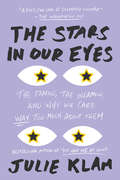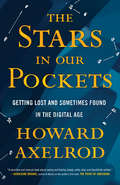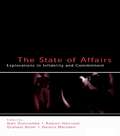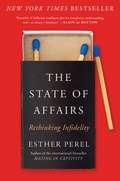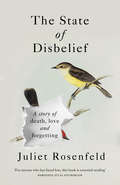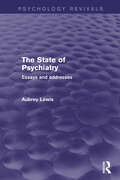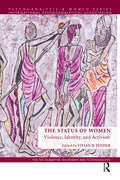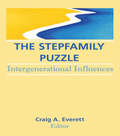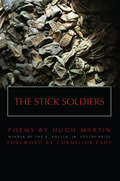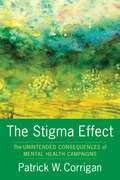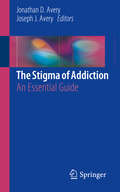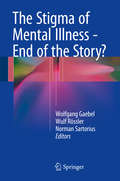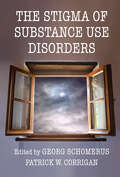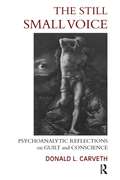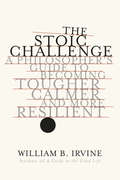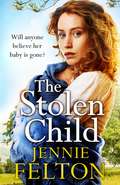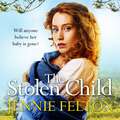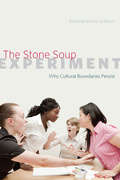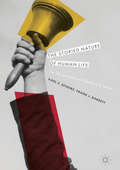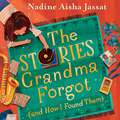- Table View
- List View
The Stars in Our Eyes: The Famous, the Infamous, and Why We Care Way Too Much About Them
by Julie KlamFrom bestselling author Julie Klam comes a lively and engaging exploration of celebrity: why celebrities fascinate us, what it means to be famous today, and why celebrities are so important. “When I was young I was convinced celebrities could save me,” Julie Klam admits in The Stars in Our Eyes, her funny and personal exploration of fame and celebrity. As she did for subjects as wide-ranging as dogs, mothers, and friendship, Klam brings her infectious curiosity and crackling wit to the topic of celebrity. As she admits, “I’ve always been enamored with celebrities,” be they movie stars, baseball players, TV actors, and now Internet sensations. “They are the us we want to be.” Celebrities today have a global presence and can be, Klam writes, “some girl on Instagram who does nude yoga and has 3.5 million followers, a thirteen-year-old ‘viner,’ and a Korean rapper who posts his videos that are viewed millions of times.” In The Stars in Our Eyes, Klam examines this phenomenon. She delves deep into what makes someone a celebrity, explains why we care about celebrities more than ever, and uncovers the bargains they make with the public and the burdens they bear to sustain this status. The result is an engaging, astute, and eye-opening look into celebrity that reveals the truths about fame as it elucidates why it’s such an important part of life today.
The Stars in Our Pockets: Getting Lost and Sometimes Found in the Digital Age
by Howard AxelrodWhat shapes our sense of place, our sense of time, and our memory? How is technology changing the way we make sense of the world and of ourselves?The human brain's ability to adapt has been an evolutionary advantage for the last 40,000 years, but now, for the first time in human history, we're effectively living in two environments at once--the natural and the digital--and many of the traits that help us online don't help us offline, and vice versa. Drawing on his experience of acclimating to a life of solitude in the woods and then to digital life upon his return to the city, Howard Axelrod explores the human brain's impressive but indiscriminate ability to adapt to its surroundings. The Stars in Our Pockets is a portrait of, as well as a meditation on, what Axelrod comes to think of as "inner climate change." Just as we're losing diversity of plant and animal species due to the environmental crisis, so too are we losing the diversity and range of our minds due to changes in our cognitive environment.As we navigate the rapid shifts between the physical and digital realms, what traits are we trading without being aware of it? The Stars in Our Pockets is a personal and profound reminder of the world around us and the worlds within us--and how, as alienated as we may sometimes feel, they were made for each other.
The State of Affairs: Explorations in infidelity and Commitment (LEA's Series on Personal Relationships)
by Jean Duncombe, Kaeren Harrison, Graham Allan and Dennis MarsdenThis volume brings together contributions on the study of sexual affairs in committed personal relationships. The editors enlisted colleagues with varied theoretical and methodological perspectives from Britain, the United States, and other countries. Together, their contributions provide a broad, cross-national perspective on affairs. Grounded in theoretical discussion, the chapters in this book introduce data collected by a broad range of methods, including attitude surveys, large statistical cohort studies, case studies, depth interviews, and group discussions. A number of contributors locate the theoretical discussion of affairs within the broader contemporary ordering of committed relationships, contrasting the liberating and empowering aspects of affairs with the damage they may inflict on society as a whole and on the lives of individuals and families. The themes of passion, transgression, secrecy, lies, betrayal, and gossip are common to a range of chapters throughout. The volume provides broad literature reviews and theoretical discussions concerning particular aspects of affairs, such as communication and jealousy. In addition, case studies are used for the more detailed exploration of heterosexual affairs and contemporary developments in gay male and lesbian relationships. The State of Affairs will be of interest to researchers, scholars, and students in social psychology; communication; sociology; family, social, and clinical psychology; and for practitioners in couple counseling.
The State of Affairs: Rethinking Infidelity
by Esther Perel<P>Iconic couples’ therapist and bestselling author of Mating in Captivity Esther Perel returns with a provocative look at relationships through the lens of infidelity. <P>Affairs, she argues, have a lot to teach us about the human heart—what we expect, what we think we want, and what we feel entitled to. They offer a unique window into our personal and cultural attitudes about love, lust, and commitment. Through examining illicit love from multiple angles, Perel invites readers into an honest, enlightened, and entertaining exploration of modern marriage in its many variations. <P>An affair: it can rob a couple of their relationship, their happiness, their very identity. And yet, this extremely common human experience is so poorly understood. Adultery has existed since marriage was invented, and so too the prohibition against it—in fact, it has a tenacity that marriage can only envy. So what are we to make of this time-honored taboo—universally forbidden yet universally practiced? Why do people cheat—even those in happy marriages? Why does an affair hurt so much? When we say infidelity, what exactly do we mean? Do our romantic expectations of marriage set us up for betrayal? Is there such a thing as an affair-proof marriage? Is it possible to love more than one person at once? Can an affair ever help a marriage? Perel weaves real-life case stories with incisive psychological and cultural analysis in this fast-paced and compelling book. <P>For the past ten years, Perel has traveled the globe and worked with hundreds of couples who have grappled with infidelity. Betrayal hurts, she writes, but it can be healed. An affair can even be the doorway to a new marriage—with the same person. With the right approach, couples can grow and learn from these tumultuous experiences, together or apart. <P>Fiercely intelligent, The State of Affairs provides a daring framework for understanding the intricacies of love and desire. As Perel observes, “Love is messy; infidelity more so. But it is also a window, like no other, into the crevices of the human heart.” <P><b>A New York Times Bestseller</b>
The State of Disbelief: A story of death, love and forgetting
by Juliet Rosenfeld'A beautifully written, profoundly moving and immersive account of grief that will bring solace.' - Louise France, The TimesA revelatory book about death and mourning by a psychotherapist faced with sudden bereavement.When Juliet Rosenfeld’s husband dies of lung cancer only seven months into their marriage, everything she has learnt about death as a psychotherapist is turned on its head.As she attempts to navigate her way through her own devastating experience of loss, Rosenfeld turns to her battered copy of Freud’s seminal essay 'Mourning and Melancholia'. Inspired by the distinction Freud draws between the savage trauma of loss that occurs at the moment of death - grief - and the longer, unpredictable evolution of that loss into something that we call mourning, Rosenfeld finds herself dramatically rethinking the commonly held therapeutic idea of 'working through stages of grief'.This is a beautifully written meditation on what the investment of love means and how to find your own path after bereavement in order for life to continue.
The State of Disbelief: A story of death, love and forgetting
by Juliet Rosenfeld'A beautifully written, profoundly moving and immersive account of grief that will bring solace.' - Louise France, The TimesA revelatory book about death and mourning by a psychotherapist faced with sudden bereavement.When Juliet Rosenfeld’s husband dies of lung cancer only seven months into their marriage, everything she has learnt about death as a psychotherapist is turned on its head.As she attempts to navigate her way through her own devastating experience of loss, Rosenfeld turns to her battered copy of Freud’s seminal essay 'Mourning and Melancholia'. Inspired by the distinction Freud draws between the savage trauma of loss that occurs at the moment of death - grief - and the longer, unpredictable evolution of that loss into something that we call mourning, Rosenfeld finds herself dramatically rethinking the commonly held therapeutic idea of 'working through stages of grief'.This is a beautifully written meditation on what the investment of love means and how to find your own path after bereavement in order for life to continue.
The State of Psychiatry: Essays and addresses (Psychology Revivals)
by Aubrey LewisTo mark his retirement in 1966 from the Professorship of Psychiatry at the University of London, and the directorship of the Institute of Psychiatry, the Maudsley Hospital, Professor Lewis’s students edited and prepared an edition of his collected papers, in two volumes. Originally published in 1967 this volume reviews the psychiatric past, surveys the transitional stage psychiatry had reached, and looks forward to the attainable future. The author pays much attention to disputed areas of psychiatric practice and inquiry, how psychiatrists should be chosen and educated, what concepts and methods are required for the furtherance of the subject, what part should social treatment and psychological treatment play. Today it can be read and enjoyed in its historical context.
The Status of Women: Violence, Identity, and Activism (Psychoanalysis and Women Series)
by Vivian B. PenderThis book examines the status of women in different eras and in different areas of society. The contributors draw on their international experience to consider how women are viewed and treated in society today and offer perspectives on why the status of women and girls has not changed in some areas.
The Stepfamily Puzzle: Intergenerational Influences
by Craig EverettDo stepfamilies experience greater levels of stressors than first families? Do they also experience more negative manifestations of stress? Find the latest research on these questions and more in this groundbreaking exploration of the complex factors and dynamics that make up stepfamilies. The Stepfamily Puzzle fills a gap in research that has not kept pace with the rapid growth of interest in this subject. It sets some of the pieces of the stepfamily puzzle into an intergenerational framework that includes the roles of grandparents, parent-child interactions, the struggles to define boundaries and achieve marital intimacy, and the underlying effects of financial support on stepfamily well-being. The Stepfamily Puzzle compares the effects of stress in stepfamilies and conditions in other families and reveals that the differences between the two types of families may not be as dramatic as long assumed. It also examines in-depth the emotional and financial stressors that impact stepfamilies and how this stress is exhibited in family relationships. Other groundbreaking research presented in this book includes: the closeness of relationships between children and grandparents in stepfamilies as compared to children and grandparents in first families effects of ongoing attachment to the former spouse on post-divorce relationships stepsibling subsystems a comparison of self-esteem and behavior problems of stepchildren and children in other family structures social support received by children in stepmother, stepfather, and intact families quality of stepfather-adolescent relationships effect of child support on stepfamily satisfactionTherapists, attorneys, and those interested in the numerous therapeutic and psychoeducational programs, self-help groups, and trade literature available on stepfamily relationships will find The Stepfamily Puzzle a valuable introduction to current research in this area. By presenting the complex variables that interact within stepfamilies, this book helps professionals understand the dynamics behind stepfamily relationships so they can provide effective support and care.
The Stick Soldiers
by Hugh Martin Cornelius EadyAt age nineteen, Hugh Martin withdrew from college for deployment to Iraq. After training at Fort Bragg, Martin spent 2004 in Iraq as the driver of his platoon sergeant's Humvee. He participated in hundreds of missions including raids, conducting foot patrols, clearing routes for IEDs, disposing of unexploded ordnance, and searching thousands of Iraqi vehicles. These poems recount his time in basic training, his preparation for Iraq, his experience withdrawing from school, and ultimately, the final journey to Iraq and back home to Ohio.Hugh Martin holds an MFA from Arizona State University. He is a Stegner Fellow at Stanford University.
The Stick Soldiers (New Poets of America #35)
by Hugh MartinAt age nineteen, Hugh Martin withdrew from college for deployment to Iraq. After training at Fort Bragg, Martin spent 2004 in Iraq as the driver of his platoon sergeant's Humvee. He participated in hundreds of missions including raids, conducting foot patrols, clearing routes for IEDs, disposing of unexploded ordnance, and searching thousands of Iraqi vehicles. These poems recount his time in basic training, his preparation for Iraq, his experience withdrawing from school, and ultimately, the final journey to Iraq and back home to Ohio.Hugh Martin holds an MFA from Arizona State University. He is a Stegner Fellow at Stanford University.
The Stigma Effect: Unintended Consequences of Mental Health Campaigns
by Patrick CorriganDespite efforts to redress the prejudice and discrimination faced by people with mental illness, a pervasive stigma remains. Many well-meant programs have attempted to counter stigma with affirming attitudes of recovery and self-determination. Yet the results of these efforts have been mixed. In The Stigma Effect, psychologist Patrick W. Corrigan examines the unintended consequences of mental health campaigns and proposes new policies in their place.Corrigan analyzes the agendas of government agencies, mental health care providers, and social service agencies that work with people with mental illness, dissecting how their best intentions can misfire. For example, a campaign to change the language around mental illness by replacing supposedly stigmatizing words with empowering ones has made little difference in how people with mental health conditions are viewed. Educational programs that frame mental illness as a brain disorder have made the general public less likely to blame people for their illnesses, but also skeptical that such conditions can be cured. Ultimately, Corrigan argues that effective strategies require leadership by those with lived experience, as their recovery stories replace ideas of incompetence and dangerousness with ones of hope and empowerment. As an experienced clinical researcher, as an advocate, and as a person who has struggled with such prejudices, Corrigan challenges readers to carefully examine anti-stigma programs and reckon with their true effects.
The Stigma of Addiction: An Essential Guide
by Jonathan D. Avery Joseph J. AveryThis book explores the stigma of addiction and discusses ways to improve negative attitudes for better health outcomes. Written by experts in the field of addiction, the text takes a reader-friendly approach to the essentials of addiction stigma across settings and demographics. The authors reveal the challenges patients face in the spaces that should be the safest, including the home, the workplace, the justice system, and even the clinical community. The text aims to deliver tools to professionals who work with individuals with substance use disorders and lay persons seeking to combat stigma and promote recovery. The Stigma of Addiction is an excellent resource for psychiatrists, addiction medicine specialists, students across specialties, researchers, public health officials, and individuals with substance use disorders and their families.
The Stigma of Mental Illness - End of the Story?
by Norman Sartorius Wolfgang Gaebel Wulf RösslerThis book makes a highly innovativecontribution to overcoming the stigma and discrimination associated with mentalillness - still the heaviest burden both for those afflicted and those caringfor them. The scene is set by the presentation of different fundamentalperspectives on the problem of stigma and discrimination by researchers,consumers, families, and human rights experts. Current knowledge and practiceused in reducing stigma are then described, with information on the programmesadopted across the world and their utility, feasibility, and effectiveness. Thecore of the volume comprises descriptions of new approaches and innovativeprogrammes specifically designed to overcome stigma and discrimination. In theclosing part of the book, the editors - all respected experts in the field -summarize some of the most important evidence- and experience-basedrecommendations for future action to successfully rewrite the long andburdensome 'story' of mental illness stigma and discrimination.
The Stigma of Substance Use Disorders
by Patrick W. Corrigan Georg SchomerusStigma and discrimination of people with substance use disorders (SUD) contribute massively to the harm done by their condition: stigma has negative effects on service engagement, life opportunities, and personal shame, both for those who struggle with substance abuse and their families. Overcoming the stigma of substance use disorders is essential to aid recovery in those with SUD. This book provides an in-depth understanding of the stigma of SUD, and proposes ways to overcome it in different settings from the criminal justice system to healthcare. Combining a multitude of viewpoints within a consistent theoretical framework, this book both summarizes the latest evidence and gives hands-on advice and future directions on how to combat the stigma of SUD. People with lived experience of SUD, advocates, family members, policy makers, providers and researchers in the field of addiction stigma will greatly benefit from reading this book.
The Still Small Voice: Psychoanalytic Reflections on Guilt and Conscience
by Donald L. CarvethWhereas Freud himself viewed conscience as one of the functions of the superego, in The Still Small Voice: Psychoanalytic Reflections on Guilt and Conscience, the author argues that superego and conscience are distinct mental functions and that, therefore, a fourth mental structure, the conscience, needs to be added to the psychoanalytic structural theory of the mind. He claims that while both conscience and superego originate in the so-called pre-oedipal phase of infant and child development they are comprised of contrasting and often conflicting identifications. The primary object, still most often the mother, is inevitably experienced as, on the one hand, nurturing and soothing and, on the other, as frustrating and persecuting. Conscience is formed in identification with the nurturer; the superego in identification with the aggressor. There is a principle of reciprocity at work in the human psyche: for love received one seeks to return love; for hate, hate (the talion law).
The Stoic Challenge: A Philosopher's Guide To Becoming Tougher, Calmer, And More Resilient
by William B. IrvineA practical, refreshingly optimistic guide that uses centuries-old wisdom to help us better cope with the stresses of modern living. Some people bounce back in response to setbacks; others break. We often think that these responses are hardwired, but fortunately this is not the case. Stoicism offers us an alternative approach. Plumbing the wisdom of one of the most popular and successful schools of thought from ancient Rome, philosopher William B. Irvine teaches us to turn any challenge on its head. The Stoic Challenge, then, is the ultimate guide to improving your quality of life through tactics developed by ancient Stoics, from Marcus Aurelius and Seneca to Epictetus. This book uniquely combines ancient Stoic insights with techniques discovered by contemporary psychological research, such as anchoring and framing. The result is a surprisingly simple strategy for dealing with life’s unpleasant and unexpected challenges—from minor setbacks like being caught in a traffic jam or having a flight cancelled to major setbacks like those experienced by physicist Stephen Hawking, who slowly lost the ability to move, and writer Jean-Dominique Bauby, who suffered from locked-in syndrome. The Stoics discovered that thinking of challenges as tests of character can dramatically alter our emotional response to them. Irvine’s updated “Stoic test strategy” teaches us how to transform life’s stumbling blocks into opportunities for becoming calmer, tougher, and more resilient. Not only can we overcome everyday obstacles—we can benefit from them, too.
The Stolen Child: The most heartwrenching and heartwarming saga you'll read this year
by Jennie Felton'One of the nation's favourite saga writers' Lancashire Post'A real heartbreaker' Peterborough Telegraph'Brimming with high drama, anguish, love, loss, tragedy, and gripping twists and turns, this is an absorbing and poignant story... Felton, a born storyteller, has a warm and compassionate heart...and an eye for the rich period detail that brings the past to life' Lancashire PostA powerful new saga from Jennie Felton in the grand tradition of Josephine Cox, Dilly Court, Maggie Hope and Rosie Goodwin of love, loss, tragedy, drama, secrets and twists and turns.Readers are hooked by The Stolen Child!'Like the twists and turns...a great read' 5* reader review'Keeps you on the edge...could not put it down' 5* reader review'A heartbreaking read. 5 stars' 5* reader review'A must read' 5* reader reviewWill anyone believe her baby is gone?When Stella Swift is discovered holding a shard of broken glass near her newborn baby boy, fears that she might harm William result in her being taken to Catcombe - the local asylum. Although the regime is not as harsh as it once was, it's not somewhere that Tom wants to send his wife - but he has no choice.Turning to his kind-hearted sister-in-law Grace for help taking care of his other three children whilst he keeps working at the mine seems like the simplest solution until Stella is well - if only there wasn't the shared history between Tom and Grace...At first Catcombe seems to offer the respite Stella needs - until one day she becomes convinced that the baby the nurses have given to her is not William. Is Stella losing her mind? Or is it true that a mother will always know her own child?Don't miss Jennie's Families of Fairley Terrace series, which began with Maggie's story in All The Dark Secrets and continued with Lucy's story in The Miner's Daughter, Edie's story in The Girl Below Stairs, Carina's story in The Widow's Promise and Laurel's story in The Sister's Secret.
The Stolen Child: The most heartwrenching and heartwarming saga you'll read this year
by Jennie Felton'One of the nation's favourite saga writers' Lancashire Post'A real heartbreaker' PeterboroughTelegraph'Brimming with high drama, anguish, love, loss, tragedy, and gripping twists and turns, this is an absorbing and poignant story... Felton, a born storyteller, has a warm and compassionate heart...and an eye for the rich period detail that brings the past to life' Lancashire PostA powerful new saga from Jennie Felton in the grand tradition of Josephine Cox, Dilly Court, Maggie Hope and Rosie Goodwin of love, loss, tragedy, drama, secrets and twists and turns.Readers are hooked by The Stolen Child!'Like the twists and turns...a great read' 5* reader review'Keeps you on the edge...could not put it down' 5* reader review'A heartbreaking read. 5 stars' 5* reader review'A must read' 5* reader reviewWill anyone believe her baby is gone?When Stella Swift is discovered holding a shard of broken glass near her newborn baby boy, fears that she might harm William result in her being taken to Catcombe - the local asylum. Although the regime is not as harsh as it once was, it's not somewhere that Tom wants to send his wife - but he has no choice.Turning to his kind-hearted sister-in-law Grace for help taking care of his other three children whilst he keeps working at the mine seems like the simplest solution until Stella is well - if only there wasn't the shared history between Tom and Grace...At first Catcombe seems to offer the respite Stella needs - until one day she becomes convinced that the baby the nurses have given to her is not William. Is Stella losing her mind? Or is it true that a mother will always know her own child?Don't miss Jennie's Families of Fairley Terrace series, which began with Maggie's story in All The Dark Secrets and continued with Lucy's story in The Miner's Daughter, Edie's story in The Girl Below Stairs, Carina's story in The Widow's Promise and Laurel's story in The Sister's Secret.
The Stolen Child: The most heartwrenching and heartwarming saga you'll read this year
by Jennie Felton'One of the nation's favourite saga writers' Lancashire PostA powerful new saga from Jennie Felton in the grand tradition of Josephine Cox, Dilly Court, Maggie Hope and Rosie Goodwin of love, loss, tragedy, drama, secrets and twists and turns.Who will believe this baby is not hers?When Stella Swift is discovered holding a shard of broken glass near her newborn baby boy, fears that she might harm William result in her being taken to Catcombe - the local asylum. Although the regime is not as harsh as it once was, it's not somewhere that Tom wants to send his wife - but he has no choice.Turning to his kind-hearted sister-in-law Grace for help taking care of his other three children whilst he keeps working at the mine seems like the simplest solution until Stella is well - if only there wasn't the shared history between Tom and Grace...At first Catcombe seems to offer the respite Stella needs - until one day she becomes convinced that the baby the nurses have given to her is not William. Is Stella losing her mind? Or is it true that a mother will always know her own child?Don't miss Jennie's Families of Fairley Terrace series, which began with Maggie's story in All The Dark Secrets and continued with Lucy's story in The Miner's Daughter, Edie's story in The Girl Below Stairs, Carina's story in The Widow's Promise and Laurel's story in The Sister's Secret.(p) 2019 Headline Publishing Group Ltd
The Stone Girl
by Alyssa B. SheinmelShe feels like a creature out of a fairy tale; a girl who discovers that her bones are really made out of stone, that her skin is really as thin as glass, that her hair is brittle as straw, that her tears have dried up so that she cries only salt. Maybe that's why it doesn't hurt when she presses hard enough to begin bleeding: it doesn't hurt, because she's not real anymore.High school senior Sarah Beth (Sethie) Weiss is disciplined. She has never cut a class in her life, has never had a grade below a B+, and has always been a favorite among her teachers. Her college applications are finished and she only ate six Ritz crackers today. But even on days when Sethie needs to eat more, there's always the toilet to make up for her mistakes. Sethie manages to get down to 104, and maybe if she works just a little bit harder, becomes a little more disciplined, she can get below 100. Truth be told, Sethie has more to worry about than her relationship with her body; but the deeper she descends into her disorder, the smaller her world gets and the harder it is to see her way out.
The Stone Soup Experiment: Why Cultural Boundaries Persist
by Deborah DowningThe Stone Soup Experiment is a remarkable story of cultural difference, of in-groups, out-groups, and how quickly and strongly the lines between them are drawn. It is also a story about simulation and reality, and how quickly the lines between them can be dismantled. In a compulsively readable account, Deborah Downing Wilson details a ten-week project in which forty university students were split into two different simulated cultures: the carefree Stoners, and the market-driven Traders. Through their eyes we are granted intimate access to the very foundations of human society: how group identities are formed and what happens when opposing ones come into contact. The experience of the Stoners and Traders is a profound testament to human sociality. Even in the form of simulation, even as a game, the participants found themselves quickly—and with real conviction—bound to the ideologies and practices of their in-group. The Stoners enjoyed their days lounging, chatting, and making crafts, while the Traders—through a complex market of playing cards—competed for the highest bankrolls. When they came into contact, misunderstanding, competition, and even manipulation prevailed, to the point that each group became so convinced of its own superiority that even after the simulation’s end the students could not reconcile. Throughout her riveting narrative, Downing Wilson interweaves fascinating discussions on the importance of play, emotions, and intergroup interaction in the formation and maintenance of group identities, as well as on the dynamic social processes at work when different cultural groups interact. A fascinating account of social experimentation, the book paints a vivid portrait of our deepest social tendencies and the powers they have over how we make friends and enemies alike.
The Stone Soup Experiment: Why Cultural Boundaries Persist
by Deborah Downing WilsonThe Stone Soup Experiment is a remarkable story of cultural difference, of in-groups, out-groups, and how quickly and strongly the lines between them are drawn. It is also a story about simulation and reality, and how quickly the lines between them can be dismantled. In a compulsively readable account, Deborah Downing Wilson details a ten-week project in which forty university students were split into two different simulated cultures: the carefree Stoners, and the market-driven Traders. Through their eyes we are granted intimate access to the very foundations of human society: how group identities are formed and what happens when opposing ones come into contact. The experience of the Stoners and Traders is a profound testament to human sociality. Even in the form of simulation, even as a game, the participants found themselves quickly--and with real conviction--bound to the ideologies and practices of their in-group. The Stoners enjoyed their days lounging, chatting, and making crafts, while the Traders--through a complex market of playing cards--competed for the highest bankrolls. When they came into contact, misunderstanding, competition, and even manipulation prevailed, to the point that each group became so convinced of its own superiority that even after the simulation's end the students could not reconcile. Throughout her riveting narrative, Downing Wilson interweaves fascinating discussions on the importance of play, emotions, and intergroup interaction in the formation and maintenance of group identities, as well as on the dynamic social processes at work when different cultural groups interact. A fascinating account of social experimentation, the book paints a vivid portrait of our deepest social tendencies and the powers they have over how we make friends and enemies alike.
The Storied Nature of Human Life
by Frank J. Barrett Karl E. ScheibeThis book explores Theodore Sarbin's life and work, and includes 10 of Sarbin's publications from the last two decades of his life. Theodore R. Sarbin had a career in psychology that spanned 70 years, establishing a place for social role theory in contemporary psychology and making major contributions to understandings of hypnosis, psychopathology, criminal behaviour, and imagination. This book amplifies the voice and influence of one of the most significant critical thinkers in psychology of the last century. The book serves as a commentary on changes now taking place in contemporary psychology; it is historically informed and yet focused on the future of psychological theory and practice. The book will be of great interest to psychologists, philosophers and social scientists.
The Stories Grandma Forgot (and How I Found Them)
by Nadine Aisha JassatFrom an award-winning poet comes a gripping mystery. "Grandma Farida has Alzheimer's - but I'm going to help her remember a huge secret..."Twelve-year-old Nyla's dad died when she was four, or that's what she's been told. So when Grandma Farida insists she saw him in the local supermarket, Nyla wonders if Grandma is simply "time travelling" again - the phrase she uses when Grandma forgets.But Grandma is Nyla's best friend and when she asks Nyla to find her dad and bring him home, Nyla decides to make a brand new promise to her Grandma: to find him.As Nyla turns detective and sets out on a journey through her family's past to try and find the truth, she also hopes that uncovering important stories will help her understand who she is, and where she fits in the world ...A riveting audiobook in verse about the power of memory and story-telling, and an unbreakable bond between a grandmother and granddaughter. (P) 2023 Hodder & Stoughton Limited
